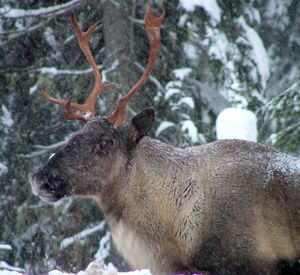BC to kill wolves in last-ditch effort to save caribou
ENDANGERED SPECIES -- Up to 24 wolves in British Columbia just north of Idaho will be shot by helicopter gunners this winter in an effort to save the 18 remaining southern Selkirk Mountains woodland caribou from extinction.
The Ministry of Forests, Lands and Natural Resources formally announced the wolf removal effort on Thursday, but the planning has been underway for more than a year, said Wayne Wakkinen, Idaho Fish and Game Department regional wildlife manager in Coeur d’Alene.
Both the predators and their prey roam across the U.S.-Canada border into North Idaho and the northeastern corner of Washington. The caribou have been listed as endangered species in the United States since 1984 and they’re also protected in British Columbia.

Idaho and Washington wildlife officials have been consulted as well as First Nations, U.S. Forest Service and U.S. Fish and Wildlife Service, Canada officials said.
In the South Peace region of the province, officials announced plans to lethally remove 120-160 wolves to save caribou herds threatened by predation. In the four caribou herds that roam that that region, at least 37 percent of all adult mortalities have been documented as wolf predations, Canada officials said.
The South Selkirk herd has declined from 46 caribou in 2009 to 27 in 2012, and to 18 in a survey conducted 10 months ago. Evidence points to wolves being the leading cause of mortality, officials said.
Caribou in the South Selkirk Mountains have been struggling, largely from losses of old-growth habitat and related issues, despite releases of new animals in Canada to bolster the numbers. Snowmobiling has been restricted in most of the core recovery area in Canada and the United States.
“BC considered removing wolves last year,” Wakkinen said. “We authorized them to operate south into Idaho up to 12 miles for any wolf control action to benefit caribou, but they never used it.”
Six of the South Selkirk caribou were captured last winter and radio-collared. While monitoring the animals, Canada researchers learned that two caribou – 11 percent of the remaining herd – were killed by wolves in the past 10 months.
The researchers later captured and fixed radio collars on wolves in two of the three packs in the Selkirk Caribou Recovery Zone to monitor their movements.
“The wolves were collared with the intent of a control action later this winter to eliminate those wolf packs in the caribou recovery area,” Wakkinen said.
Mountain lions also have killed caribou in the wider Purcells-Selkirk region, ministry reports say.
“Two of the wolf packs are north of BC Highway 3 and one is south of the highway and often right on the border in the northern tier of Idaho,” Wakkinen said. Wolves regularly roam the Boundary Lake area of Idaho, he said.
Last week, radio-collared caribou were in Washington “within a sling-shot distance of Canada and Idaho,” Wakkinen said.
Washington has not given Canada officials authority for wolf control, said state Fish and Wildlife wolf policy director Dave Ware.
- Washington's Wolf Management Plan would prevent state officials from killing wolves even to protect endangered caribou, said Kevin Robinette, department regional wildlife manager in Spokane. "It would be a long process," he said today, noting that Idaho has removed special protections for wolves.
Hunting and trapping of wolves in British Columbia have not effectively reduced populations and may even split up packs and increase predation rates on caribou, officials said.
Habitat recovery continues to be an important part of caribou recovery, but cannot address the critical needs of these herds in the short term, they said.
- Read more about British Columbia efforts to saves woodland caribou and control wolves at http://www.env.gov.bc.ca/wld/speciesconservation/mc/
- Nearly 1,000 wolves have been killed in Alberta since 2006 under a similar program to curb the declining trend of caribou, according to the Vancouver Sun.

